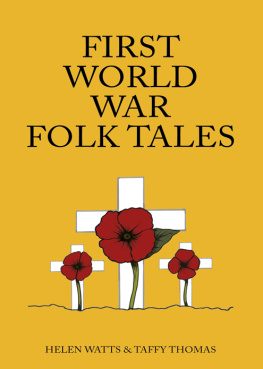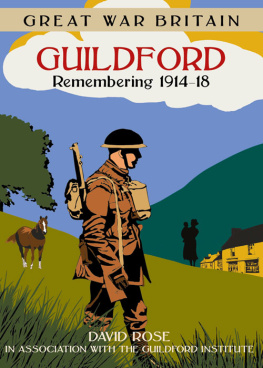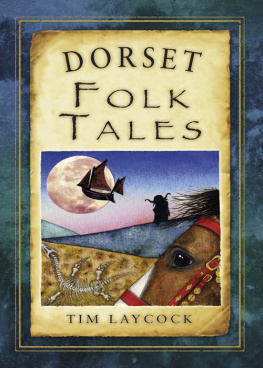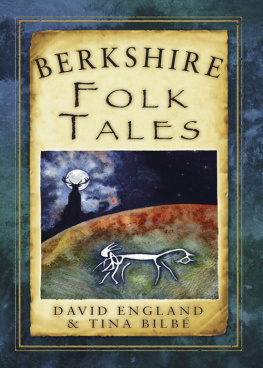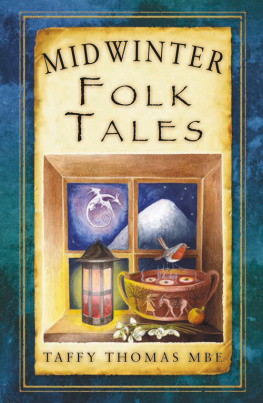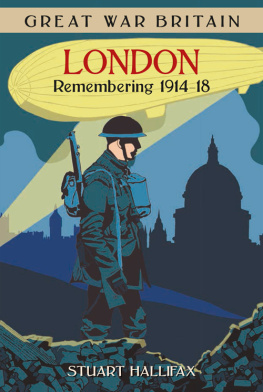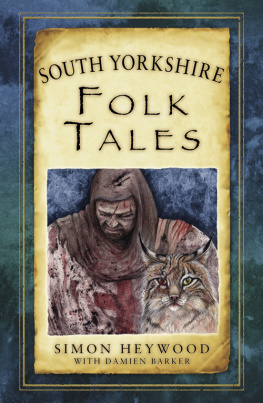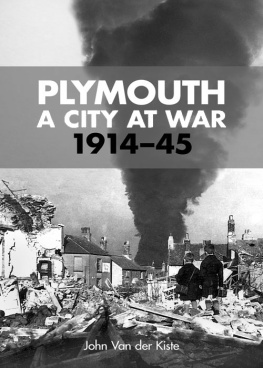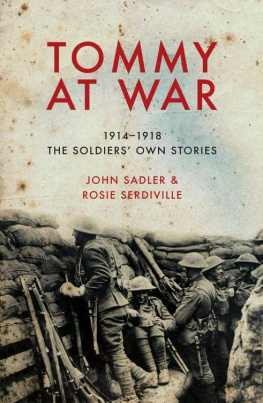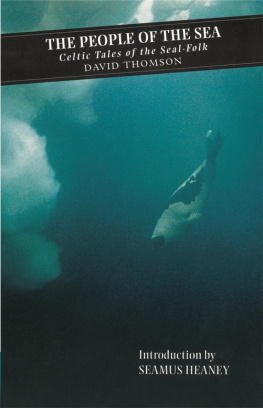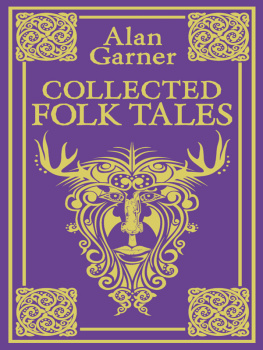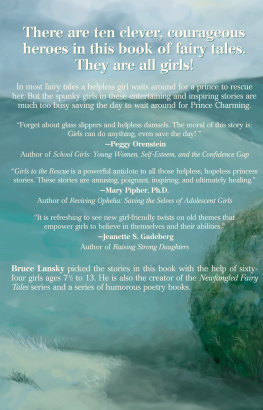In memory of:
Edward Victor French (18871965), miller and farmer from Merriott in Somerset and Taffy Thomas grand- father, who fought on the Gallipoli Peninsula in 1915
&
Archibald Archie Oldham (18881958) of Heywood, Lancashire and Helen Watts great-grandfather, who served as a private in the 1st Manchester Regiment from 191418 and who was wounded by a bullet in the neck while fighting in Palestine.
Contents
Illustrations by Steven Gregg.
Only Remembered traditional English version by John Tams, lyrics reproduced by permission of John Tams. Old Brown based on a traditional rhyme told to us by Albert Nabs Smith. The Rushbearing by William Wordsworth (17701850), written in 1815 out of copyright. Saint Oswalds Day hymn words by Canon Hardwicke Drummond Rawnsley (18511920). Strange Meeting by Wilfred Owen (18931918), written in 1918 out of copyright. War (Rhyfel) by Ellis Evans (18871917), translated by Alan Llwyd for Out of the Fire of Hell: Welsh Experience of the Great War 19141918 in Prose and Verse (Gomer Press, 2008), reprinted by permission of Alan Llwyd. The story of Gilbert Insall based on the original text Gilbert Stuart Martin Insall and Thomas Ham Donald (from the archive Tales of the VC) from www.europeana19141918.eu/en/contributions/ 5375#prettyPhoto Creative Commons Attribution-Share Alike 3.0 Unported licence (CC BY-SA 3.0). The Photo of the Girl I Left Behind Me song lyrics written and composed by Billy Merson (18811947). The Girl I Left Behind Me traditional folk song also known as Brighton Camp, lyrics first published in Skillerns Twenty Four Country Dances for the Year 1799 by Thomas Skillern, derived from the traditional song The Girl I Left Behind Me, lyrics first published in The Charms of Melody, Dublin, Ireland, issue no. 72, printed in Dublin from 1791. Its A Long, Long Way To Tipperary by Jack Judge (18721938) and Harry Williams, written in 1912. In Flanders Fields by Lt Col John McCrae (18721918), written in 1915, first published in the Punch magazine in December 1915.
Every effort has been made to contact copyright holders of material reproduced in this collection but, where this has not been possible, the authors would like to apologise for any cases of unintentional copyright transgression and would like to hear from any copyright holders not acknowledged.
Only Remembered
Fading away like the stars in the morning,
Losing their light in the glorious sun,
Thus would we pass from this earth and its toiling,
Only remembered for what we have done.
Only the truth in the fife we have spoken,
Only the seed that in life we have sown,
These shall pass onwards when we are forgotten,
Only remembered for what we have done.
Wholl sing the anthem and wholl tell the story,
Will the line hold will it scatter and run,
Shall we at last be united in glory,
Only remembered for what we have done?
Traditional English / John Tams
W ar has always played a powerful part in the story of our countrys history. Every battle, every campaign from Hastings to Culloden, from the Crimean to the Falklands has its own story and each has something to teach us about our relationships with our fellow human beings, about our ambitions and our dreams, our strengths and our weaknesses, and our capacity for love and for hate.
But of all the wars which have affected our nation, it is perhaps the Great War of 191418 which has left the biggest mark and it truly was a great war. Never before had so many nations, from all over the globe, come up against one another at the same time; never before had armed forces of such numbers clashed on so many fronts and on so many battlefields; and never before had the impact of a war been so powerful. More than twenty-seven countries, including men and women from Britains colonies all over the world, took part in the war and by the end of it more than 16 million people were dead (about half of those being civilians), another 21 million had been wounded, and the balance of power in Europe as well as the country borders which formed the European map had been shifted completely.
One hundred years on, as we remember what happened during those four long years, the First World War continues to stir up strong feelings. We are shocked by the millions of lives which were lost and it is hard not to question the tactics chosen by the generals who, from behind the safety of their desks in their headquarters, made decisions which so often put the lives of men fighting on the front line at risk. We find it hard to believe that so much of the war was fought out of filthy, mud-ridden trenches and that soldiers could be stuck there for months on end, thousands of them dying in order to advance just a few metres into enemy territory. We find it difficult to understand how wave upon wave of troops could be sent over the top to their deaths hundreds of soldiers at a time being ordered to climb out of the trenches and advance straight into enemy fire across no-mans-land.
Yet while the First World War was horrific, brutal and bloody, it was also crucial in terms of stabilising Europe, redefining the European map and preventing any one country from becoming too powerful. It was a fight for democracy in which Britain and her Allies (and then the United States of America when they joined the war in April 1917) were battling against the autocratic, military threat being imposed by Germany and Austro-Hungary, which also brought about the downfall of Tsarist rule in Russia. Crucially, for Britain, it was a fight for liberty and those who survived it were proud to be part of a nation which had defeated its enemy by pulling together and standing firm.
P eople remember their history as stories, recounting their experiences, their feelings, their hopes, fears and dreams in tales sometimes written down and often shared by word of mouth. The stories they choose to pass on are a restatement of our cultural identity and can reveal more about the feelings of folk than any history book.
When the last fighting Tommy, Harry Patch, died at the age of 111 in 2009, there were those who feared that this also meant the demise of the tales from the First World War trenches. They could not be more wrong, for folk tales have a life of their own, giving them a unique kind of immortality. Thousands of stories, told both during the years of 191418 and after the conflict had ended, have survived as fragments entrusted to relatives in spidery handwriting in letters home and remembered through oral anecdotes, such as those shared when grandchildren discover an old tin hat or a gas mask.
These are just slivers, precious scraps of information linking decades and generations. However, with love and care, Helen Watts (an experienced author and editor) and Taffy Thomas (a storyteller who has spent his life immersed in folklore and popular culture) have worked to reconstitute these shards into retellable tales for the current and future generations of historians and storytellers.
The diaries and the letters home reveal the narrative of the struggle and something of the feelings of those who were there in the trenches. The poetry and the songs from the popular entertainment of the day music halls and variety theatres reveal something of the feelings of relatives and survivors on the Home Front. All are included in this unique collection.
As you absorb the tales of heroic men and women who changed the course of history, remember that their diaries and their stories show that most of them didnt consider themselves unusual or heroic; just ordinary folk who answered the call. Cling to the words of George Bernard Shaw, who commented:
Next page
